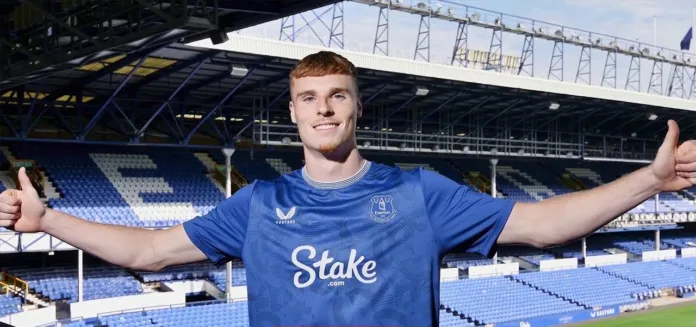Everton strengthens defense with the signing of 23-year-old Jake O’Brien from Lyon, as the club eyes a robust Premier League Campaign
Everton has made a significant addition to their squad by signing Jake O’Brien from Olympique Lyonnais in a deal worth £17 million. The 23-year-old Irish defender has committed to a four-year contract, with an option for a fifth year, enhancing Everton’s defensive lineup ahead of the upcoming Premier League season. This acquisition is the club’s fifth major signing this summer, following Tim Iroegbunam, Jack Harrison, Iliman Ndiaye, and Jesper Lindstrøm.
O’Brien, who was a regular starter at Lyon, will bring his considerable skills to Goodison Park, where he will face competition from established players like Jarrad Branthwaite and James Tarkowski. Despite rumours surrounding Branthwaite’s future, he is expected to stay at the club, potentially forming a solid partnership with O’Brien.
The transfer was heavily influenced by Everton’s captain Seamus Coleman, who reportedly played a crucial role in persuading his fellow countryman to join the club. O’Brien expressed his excitement about the move, highlighting the historic nature of Everton and the opportunity to play under Coleman, whom he regards highly.
Everton fans have responded positively to the signing, recognizing O’Brien’s potential and the strategic nature of the club’s recent transfer activities. As Everton gears up for the new season, O’Brien’s addition is seen as a key move to bolster their defence and aim for higher league standings.
Analysis:
Political: The signing of Jake O’Brien can be seen as a strategic move in the broader context of Everton’s ambition to reclaim their status as a top club in the Premier League. This transfer aligns with the club’s recent efforts to invest in young, promising talent, which can be interpreted as a politically savvy strategy to build a team capable of challenging the traditional powerhouses of English football. The move also reflects the club’s commitment to making a statement in the transfer market, signalling its readiness to compete at the highest levels.
Social: Socially, O’Brien’s signing is significant as it showcases the influence of national pride and camaraderie in football. The involvement of Seamus Coleman, a respected figure at Everton and in Irish football, highlights the importance of interpersonal relationships and national ties in sports. This transfer also resonates with the fans’ desire for players who are not only talented but also share a connection with the club’s ethos and history. O’Brien’s admiration for Coleman and his eagerness to join Everton underline the role of leadership and mentorship in shaping team dynamics.
Racial: While the transfer of Jake O’Brien primarily focuses on footballing capabilities, it also subtly touches on the racial dynamics within the sport. As a player of Irish descent, O’Brien joins a diverse squad at Everton, contributing to the multicultural fabric of the team. This inclusion reflects the broader trends in football, where diversity is increasingly embraced and celebrated. It also highlights the importance of providing opportunities for players from different backgrounds to excel at the highest levels of the game.
Gender: The gender dynamics in this transfer highlight the ongoing challenges in achieving gender equity in sports. While the discussion around O’Brien’s transfer centres on his professional attributes and the impact on Everton’s squad, it also underscores the broader issue of the underrepresentation of women in football, both on and off the pitch. The visibility and media coverage of such high-profile transfers often overshadow the need for increased investment in women’s football and the promotion of female talent in similar capacities.
Economical: Economically, the £17 million transfer fee for Jake O’Brien signifies a substantial investment by Everton, reflecting the club’s financial strategies and market positioning. This move is part of a broader trend in football, where clubs increasingly spend significant amounts to secure young talent with long-term potential. The financial implications of such transfers extend beyond the immediate benefits on the field, influencing the club’s brand value, merchandise sales, and global market appeal. Additionally, the transfer fee and O’Brien’s contract highlight the economic realities of football, where player valuations and salaries are driven by market demand, club ambitions, and the player’s perceived future potential.
This transfer also raises questions about the financial sustainability of such spending, particularly in a market where the economic disparities between clubs can be vast. For Everton, the challenge lies in ensuring that these investments translate into on-field success and long-term financial stability. The club’s ability to balance spending with revenue generation, especially in a competitive league like the Premier League, will be crucial in determining its future trajectory.
Overall, Jake O’Brien’s transfer to Everton is a multifaceted event with implications that extend beyond the immediate sporting context. It reflects broader societal, economic, and political dynamics, highlighting the complexities of modern football and its role as a global sport.
